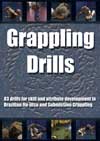
When solo grappling drills are used properly they can improve a grappler’s coordination, endurance, strength and speed. They can be used as part of a warmup session or to specifically improve aspects of your grappling game.
Let’s start with one of the most fundamental solo exercises: backwards shrimping. This is a drill that should be in every grappler’s repertoire.
How many times have you heard the advice “move your hips”, whether you were escaping from a pin or trying to apply a submission? Lateral, or side-to-side, hip movement is critical to a grappler’s game, especially when playing the guard game or escaping from bad positions.
Practicing backwards shrimping (or “ebi” in Japanese) is an effective shortcut to developing efficient side-to-side hip movement. Once mastered, there are many more challenging variations of shrimping to further improve hip mobility on the ground.
Click here to see the same Backward Shrimping video on YouTube!
An example of a more specialized solo drill is the wall spinout. Intermediate and advanced guard players often end up spinning and rotating in their guard, both to prevent guard passing and to set up their own attacks. Becoming comfortable with this sort of body position and movement via a drill like the one in the video below can improve mobility in the guard when it comes to sparring time.
You can click here to see the same Armbar Spin-Out video on YouTube.
Now spinning upside down to finish a stalled-out armbar might not be part of your game – fair enough. But I guarantee that there are other solo drills you can come up with that will help you develop some aspect of your game, no matter what your game is.
Many instructors use drills as part of the class structure, either to warm the students up, or to develop certain specific skills and movements. So you may already have been exposed to lots of different kinds of drills…
But if you’re looking for even more resources on solo and partner drills then I suggest that you take a look at the Grappling Drills DVD available on this site.



